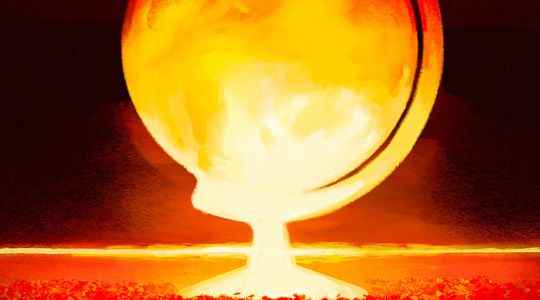The scene, surreal, was seen by millions of Russians. During a debate on the public broadcaster Rossiya 1 on April 27, excited commentators evoke in animated images the time it would take for nuclear missiles launched from the Russian enclave of Kaliningrad to reach capitals Europeans. “Berlin, 106 seconds! Paris, 200 seconds! London, 202 seconds!” methodically lists the presenter. “Count the seconds, can you intercept him? Hi, he’s already here!” connects a guest, apparently very exhilarated by this scenario. The day before, in another broadcast, the editor-in-chief of state media RT and Sputnik had dropped in an icy tone that a nuclear war seemed to her “the most likely scenario”.
mouthful of propaganda
Admittedly, Russian TV, sip of propaganda, is accustomed to this kind of excess and we must, as Frédéric Encel reminds us, keep reason. The problem is that the official statements of the Russian government are not more reassuring. On April 25, Foreign Minister Sergey Lavrov considered the danger of World War III to be “real”. “If someone intends to create unacceptable threats for Russia, he must know that our response will be rapid and withering”, added, two days later, the head of the Kremlin Vladimir Putin.
Rodomontades? Serious threats? Difficult to answer, insofar as “we still do not know Putin’s real objectives: does he want to control part of Ukraine or go to war against NATO? asks Marie Dumoulin, director of the Wider Europe program to the European Council on Foreign Relations One remark, however: in their speeches, the Russians are now emphasizing the fact that they are facing the West – and not the Ukrainians, whom they present as the puppets of the West.”
$20 billion
This change in tone is happening even as the West is stepping up military aid to Ukraine. On Tuesday, April 24, representatives from around forty states met at the German base in Ramstein to assess Ukrainian needs and coordinate their actions. Four days later, the American president, Joe Biden announced that he was going to ask Congress for an extension of … 33 billion dollars, including twenty dedicated to the shipment of heavy weapons.
Announcements that go more and more badly with Putin, who, despite colossal means, has so far achieved none of his military objectives. How, under these conditions, justify its adventurism to the population, if not by one-upmanship? “If he does not manage to gain the upper hand in a conventional way, the Russian president could be tempted to open other fronts, or even to resort to other types of armaments, in particular chemical”, continues Marie Dumoulin. What would Westerners do then? “Because of their public opinion, they would be forced to increase the military pressure, believes François Heisbourg, adviser to the Foundation for Strategic Research. By imposing, for example, a no-fly zone over Ukraine.”
Gear Risk
With, then, a real risk of gearing: Putin could then attack NATO or, worse, detonate a tactical nuclear weapon, claiming that the Western intrusion in Ukraine threatens “the very existence of the Russian State”. Objective: to create a “stunning effect” in the adversary, which could lead to the opening of negotiations… or to escalation. “No one can take this threat lightly,” CIA director Williams Burns said on April 14.
Fortunately, we are not there yet. But if such a scenario is – still – fiction, the uncertainty hovering over the intentions and the mental health of the Russian president does not create any less, in this Western Europe rocked by peace for 77 years, a climate of anxiety not seen since the Cold War. Sign of the times, the manufacturers of fallout shelters are overwhelmed with orders…
